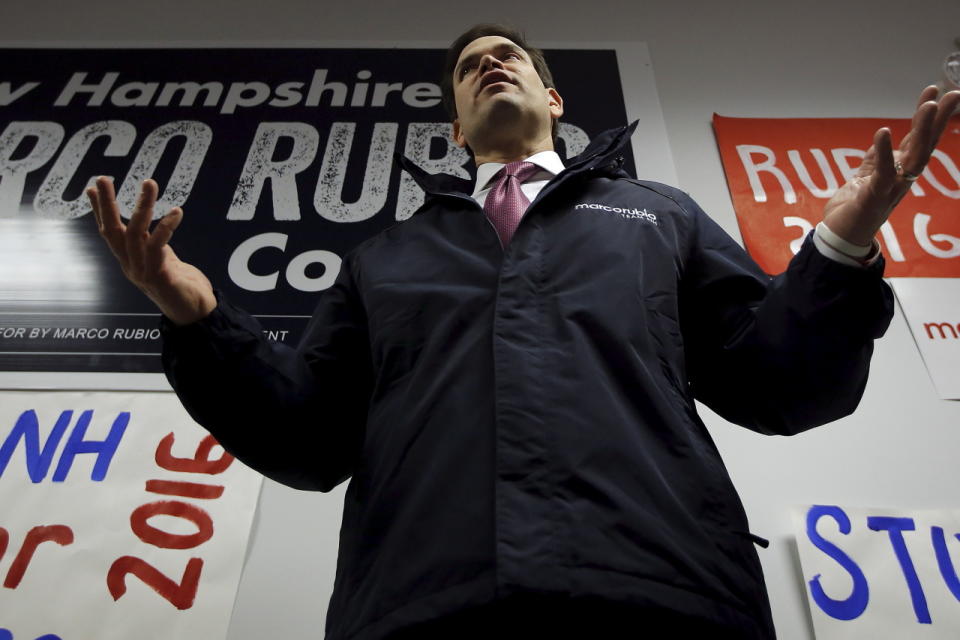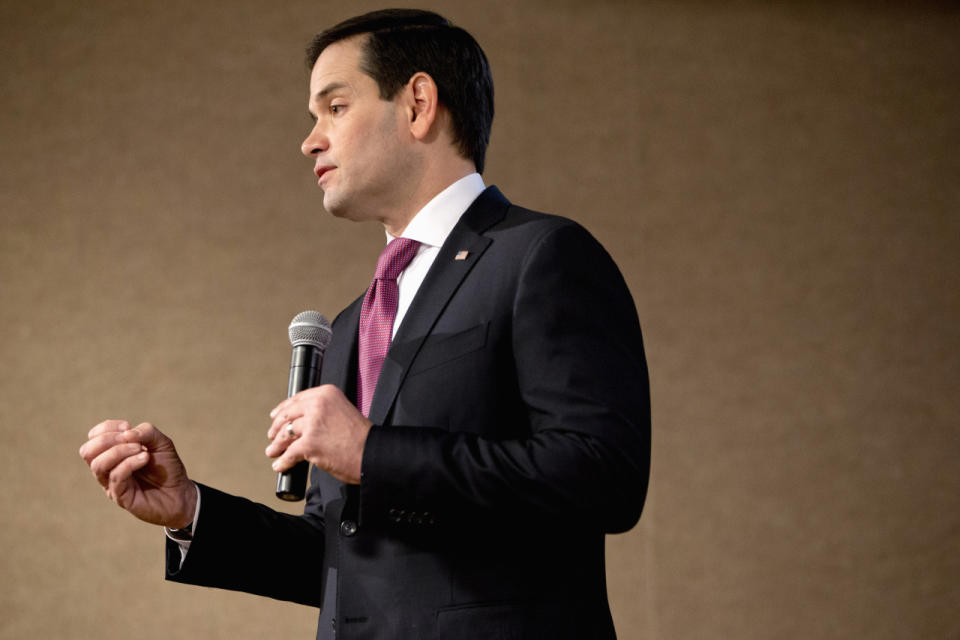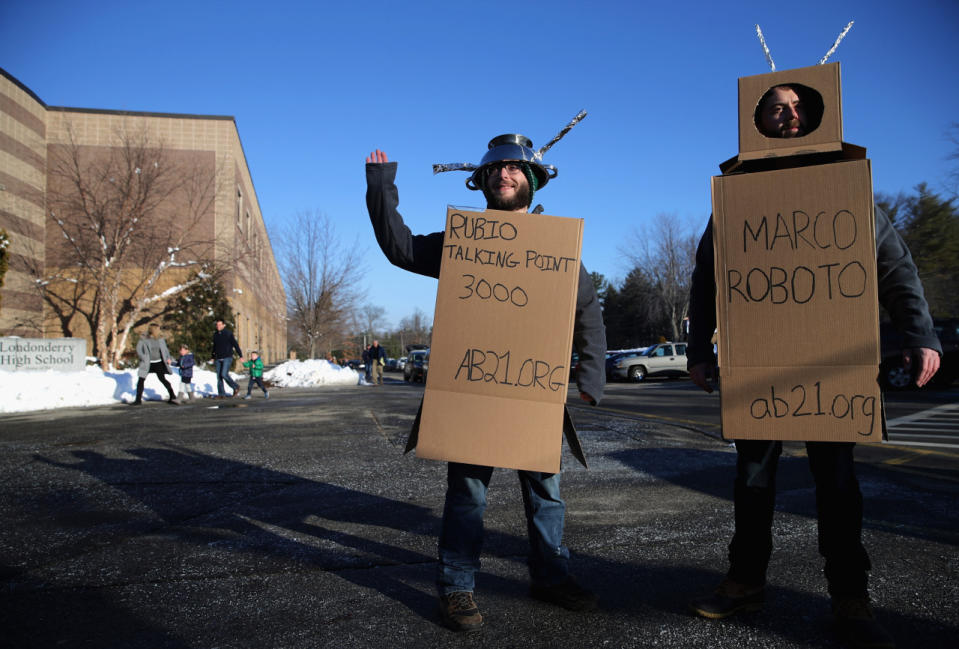Rubio searches for answers while his opponents circle
MANCHESTER, N.H. — Sen. Marco Rubio, the Florida Republican who was on track to emerge as the consensus candidate to take on businessman Donald Trump and Sen. Ted Cruz of Texas until he turned in a woeful debate performance Saturday night, continued to struggle Monday to find a response to the charge that he is too inexperienced to be president.
“My experience is understood,” Rubio said on CBS’ “This Morning.”
And that’s increasingly the problem.
Rubio talked about a bill he introduced as a member of the Florida legislature to restrict the use of eminent domain, and an anti-trafficking measure in the U.S. Senate, adding those items to a list he first started to flesh out Sunday.
Rubio’s challenge is that his résumé is far thinner than those of the three current and former governors who are gunning for him and who each want to take on Trump and Cruz themselves. New Jersey Gov. Christie — whose verbal barrage on the debate stage exposed Rubio’s lack of preparation for such an onslaught — and Florida Gov. Jeb Bush have both said for months that they are ready to be president and Rubio is not.

Republican presidential candidate Marco Rubio speaks at a campaign event in Manchester, N.H., on Monday. (Photo: Carlo Allegri/Reuters)
Suddenly, that argument is getting a new hearing, and the rush of Republican donors and party regulars to unite behind Rubio has been put on hold.
Henry Barbour, an influential Mississippi Republican, has been an outspoken proponent of the party coalescing behind one candidate after the New Hampshire primary. But he acknowledged Monday that this scenario no longer seemed realistic after Rubio’s debate debacle.
“It seems like for us to get a consensus candidate we may have to wait a little longer,” Barbour said in an interview. “And I tend to think that’s better for Cruz and Trump, which I’m not really fired up about.”
Christie took obvious pleasure in declaring the coronation halted.
“There was a march among some of the chattering class before Saturday night that Marco Rubio — it was down to a three-person race, this was it and it was over,” Christie said on MSNBC’s “Morning Joe.” “I think after Saturday night, no matter what the results are on Tuesday, no one thinks that anymore.”
The experience question first truly burst into the political conversation when former Sen. Rick Santorum, R-Pa., could not name a single accomplishment of Rubio’s when he appeared on “Morning Joe” last week after ending his own candidacy for the presidency and endorsing Rubio.
Santorum’s gift to Rubio’s campaign was to appear on TV — the notoriously controlling Rubio campaign did not itself ask Santorum to go on “Morning Joe,” according to one source — and deliver a gift-wrapped attack ad for the Christie campaign to use against Rubio.
“I guess it’s hard to say there are accomplishments,” Santorum said.
Slideshow: The battle for New Hampshire >>>
The Santorum interview was the pebble that started a landslide. Thanks in part to the Christie campaign’s gleeful promotion of it, Rubio’s résumé became a chief topic of conversation. When Rubio responded to Christie’s taunts during the debate about his inexperience by repeating the same talking points multiple times, the landslide overtook him.
But it is Rubio’s response to this moment — over the next days and weeks — that will determine whether his debate flop is “an asterisk or more of a defining moment,” as Barbour put it.
A moment like this was always coming for Rubio. The central question about his candidacy, which Yahoo News dug into last spring, has been whether he has the leadership mettle to respond gracefully and forcefully under pressure. His Senate career has raised questions about that. And presidential campaigns, as crazy and comical as they can be, do put candidates through a testing and examination process that lays bare their faults and forces them to respond.
“If you can’t walk on the hot coals and weather whatever the storms are, you’re probably not deserving of being president,” Bush recently said in an interview with Politico’s Glenn Thrush.
Now Rubio gets to answer the question. And many voters in New Hampshire and in states that will vote in the coming weeks will be watching his response to gauge whether he has the intangible leadership qualities that so many look for when picking a president.
On Monday night, Rubio stumbled slightly again, repeating the same phrases and pausing awkwardly as he realized he was doing so.
Slideshow: New Hampshire votes >>>
Of course, it’s not enough for Rubio’s rivals to slow him down, and there are questions about whether even that has happened. If the polls are accurate, Christie remains stuck in the single digits and Rubio is still fighting with Ohio Gov. John Kasich for second place behind Trump. However, the New Hampshire debate gave him a rationale to press on to the South Carolina primary next week.
“I think Saturday night showed that regardless of what happens tomorrow, the race is going to stay very much unsettled,” said Christie adviser Mike DuHaime. “A lot of the big donors and endorsers are now going to sit back and watch this thing unfold a little bit.”

Rubio speaks during a town hall in Nashua, N.H., on Monday. (Photo: Jacquelyn Martin/AP)
And Christie argued Monday that he is better equipped than Bush to take on rival candidates like Trump when the time comes, a potentially telling comment since Christie has so far avoided challenging the businessman, even calling him a “friend” on Monday.
“[Bush] had a chance to take on Donald Trump on Saturday night, and I don’t think really effectively delivered that punch,” Christie said on “Morning Joe.”
Bush does, however, have enough money to last as long as he wants. The real question is whether he will stick around — if he fails to catch fire soon — all the way through to the March 15 primary in Florida, which is a winner-take-all contest with 99 delegates at stake. If Bush and Rubio are both still in the race at that point, it would almost certainly deliver Florida to Trump or Cruz.
Kasich also is looking for a ticket out of New Hampshire with support from the state’s famous independent voters, who make up almost 40 percent of the registered voter electorate and can vote in either the Democratic or Republican primary.
Kasich adviser John Weaver said Christie’s takedown of Rubio Saturday would help the Ohio governor because many voters would be turned off by Christie’s negativity as much as they are by Rubio’s response.
“Linebackers don’t often get the MVP trophy, but we appreciate his pointing out what a lot of people have been thinking,” Weaver said.
The polling in New Hampshire has been erratic and often even suspect. One poll Sunday, conducted by a pro-Kasich super-PAC, showed Kasich in second place behind Trump. Another on Monday showed Bush in second position.
As the presidential candidates from both parties campaigned Monday in the midst of a blizzard, the Republican race looked headed for a muddled finish that will most benefit the antiestablishment candidacies of Trump and Cruz.
Cruz ended his swing through New Hampshire Monday at a small American Legion hall here in Manchester. It was packed to the gills, though a few members sat at the bar well away from where Cruz was speaking, and a man and a woman played electronic slots in a corner.
Cruz indicated he was eager to move past New Hampshire, when “the quadrennial pestilence that descends upon this state will migrate South” to South Carolina, and to March 1, when 12 states — seven of them in the South or Midwest, including Cruz’s home state of Texas — will hold primaries or caucuses.
But Rubio’s debate misstep has helped Cruz greatly, as well as Trump.

Workers for the American Bridge 21st Century super-PAC wear robot costumes outside a Rubio town hall event in Londonderry, N.H., on Sunday. The costumes were worn to capitalize on Chris Christie’s attack on Rubio’s style and delivery of talking points. (Photo: Chip Somodevilla/Getty Images)
As for the current frontrunner, Trump began his day Monday by lying on two separate morning TV shows about his criticism of Sen. John McCain, R-Ariz., earlier this year. Trump said two different times, “I never called John McCain a loser.”
That is patently false. On July 18, Trump said of McCain’s 2008 run for the presidency: “He lost and I never liked him much after that ‘cause I don’t like losers.”
At an evening rally in downtown Manchester, Trump drew a massive crowd to the Verizon Wireless Arena, where he proceeded to repeat a comment by an audience member who called Cruz a “pussy” and then pretended to admonish the person.
But in a sign that Trump has learned not to always trust polls showing him with a lead — after losing in Iowa despite holding a lead in polls — the businessman tried to start laying groundwork for an explanation in case he underperforms or loses in New Hampshire.
“Here I have very big leads,” he said on “Morning Joe.” “But I hope the snow doesn’t affect it.”


